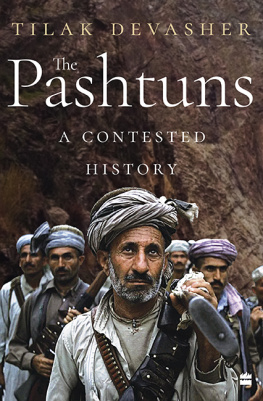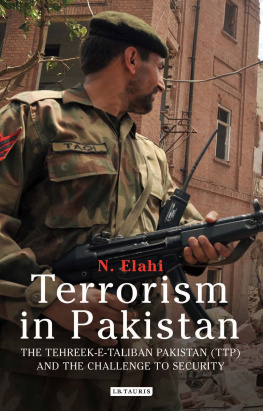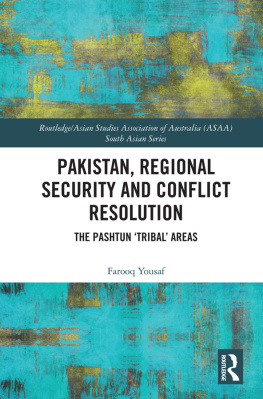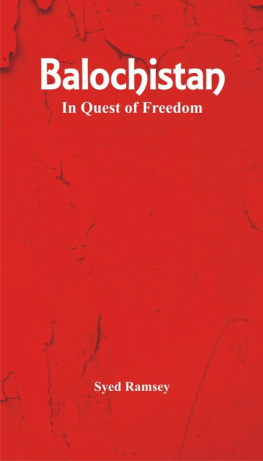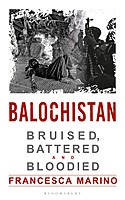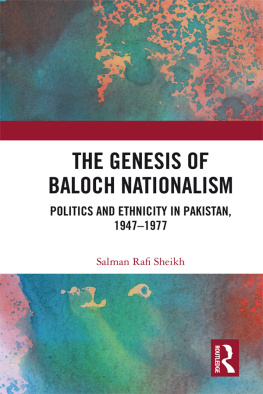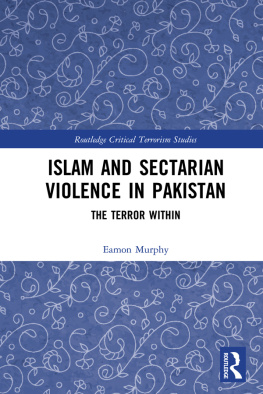Table of Contents
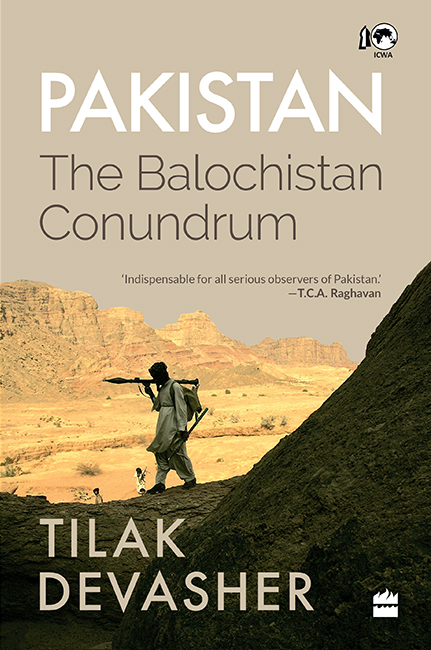
PAKISTAN
THE BALOCHISTAN
CONUNDRUM
TILAK DEVASHER

To
THE BALOCH
Who deserve better
Mujhe jang-e-azaadi ka maza maloom hai,
Balochon per zulm ki intheha maloom hai,
Mujhe zindagi bhar Pakistan mein jeenay ki dua na do,
Mujhe Pakistan me in saath saal jeenay ki saza maloom hai.
Habib Jalib
(Rough translation)
I know the pleasure of the war of independence;
I know the heights of oppression inflicted on the Baloch;
Dont pray that I should live my entire life in Pakistan;
I know the punishment of living in Pakistan for sixty years.
Contents
Overview:
The largest province of Pakistan created in July 1970.
Area:
3,47,190 sq. km; 44 per cent of land area of Pakistan.
Population:
Pakistan 2017: 207.685 million; 1998: 132.352 million. Growth: 2.4 per cent.
Balochistan 2017: 12.335 million; 1998: 6.567 million. Growth: 3.37 per cent.
Overall, 5.94 per cent of Pakistans population in 2017 as compared to 4.96 per cent in 1998.
Male: 6.4 million; Female: 5.8 million.
Population Density: 19 per sq. km
Literacy Rate: Pakistan: 58.92 per cent; Balochistan: 43.58 per cent
The Division-wise area/population:
| Division | Area
(sq. km) | Population (1998) | Districts |
| Quetta | 64,310 | 1,699,957 | Quetta, Pishin, Qila Abdullah, Chagai, Nushki. |
| Zhob | 46,200 | 1,003,851 | Zhob, Musakhail, Qila Saifullah, Loralai, Barkhan, Sherani. |
| Kalat | 140,612 | 1,457,722 | Kalat, Mastung, Khuzdar, Kharan, Washuk, Awaran, Lasbela. |
| Sibi | 270,55 | 4,94,894 | Sibi, Ziarat, Dera Bugti, Kohlu, Harnai |
| Nasirabad | 16,946 | 1,076,708 | Nasirabad, Jaffarabad, Jhal Magsi Kachi. |
| Makran | 52,067 | 832,753 | Kech, Panjgur, Gwadar |
Social Indicators
| Indicators | Balochistan | Pakistan |
| Female Literacy | 15% | 33% |
| Primary School Enrolment | 49% | 68.3% |
| Female Participation | 21% | 49.2% |
| Access to Sanitation | 7% | 18% |
Infant Mortality Rate (per 000LB) | 108 | 100 |
| Village Electrification | 25% | 75% |
Access to Safe Drinking Water | 20% | 86% |
Maps
| Districts of Balochistan | page xiv |
| Physical map of Balochistan | page 7 |
| Balochistan under the British | page 13 |
| Ethnic groups in Balochistan | page 33 |
| The Khanate of Kalat, pre-British period | page 63 |
| Areas of Balochistan ceded to Afghanistan and Iran | page 70 |
| ChinaPakistan Economic Corridor | page 178 |
Tables
| The division-wise area/population | page xii |
| Social indicators | page xii |
| Population by mother tongue | page 50 |
| Language distribution, district-wise | pages 5051 |
| Literacy rates in Pakistan (200811) | page 115 |
| Rate of growth of Gross Regional Product by province | page 125 |
| Human Development Index, district-wise | page 144 |
| Districts with lowest HDI value | page 145 |
| Districts with highest HDI value | page 146 |
| Estimated HDI for Balochistan districts | page 147 |
| Trends in regional disparity | page 152 |
| Security-force-personnel fatalities (201119) | page 251 |
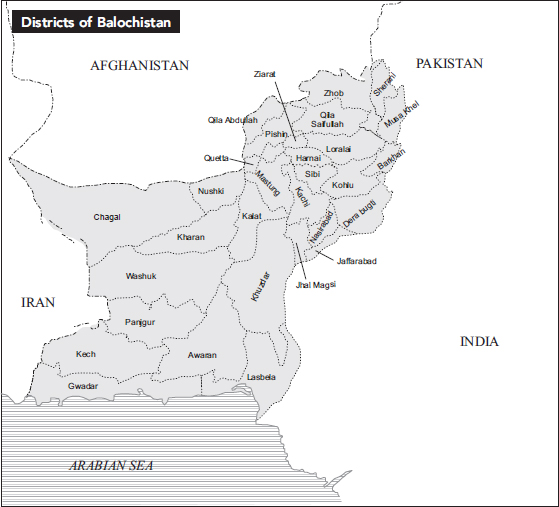
WHILE RESEARCHING FOR MY FIRST book, Pakistan: Courting the Abyss, I came across two laments about Balochistan that moved me deeply. The first was the anguished cry of a father at the enforced disappearance, i.e., extra-judicial abduction, of his son:
I am tired of speaking, of crying, of telling our story again and again. If only suicide was not prohibited by religion, I would have killed myself. The court has been hearing our case for years but my son is still not with me.
The second was the lament of a young student:
What concerns me most is a word. It is a simple word that is not heard on the lips of people in most parts of the world, but for me it is a word that desperately needs to be heard more often. Whenever I do hear this word, or say it myself, it stirs emotions that I cannot explain. I cannot do justice to the memories they evoke.
That word is Balochistan.
We pleaded and knocked on every door there is in the name of justice. Yet, no one heard us. What have we received from the people of Pakistan except neglect and torment?
The pain and pathos in these two laments motivated me to study Balochistan in all its dimensions and to try and lift the veil of secrecy that Pakistan has imposed on the province. The result is this book.
Balochistan is a complex province with two main ethnic groupsthe Baloch and Pashtuns. The book is focused on the Baloch and touches on the Pashtuns only in passing.
The words Baloch and Balochistan have been spelt in several ways over the yearsBaloch, Baluch, Belooch, Biloch, etc. In this book, the words used are Baloch and Balochistan after the 1990 provincial government decree that the official English spelling was to be Baloch. The plural of Baloch is also Baloch. The language is spelled as Balochi.
A word about statistics. Unfortunately, no two sets of statistics on the same issue match. Hence, I have tried to use the best available and, at places, have also given variations to enable the reader to make an informed judgement.
At the time of writing, the detailed results of the 2017 census have not been published. Hence, where available, the provisional census figures have been used. In other cases, figures from the 1998 census have been used.

I would like to thank the Indian Council of World Affairs (ICWA) for commissioning this book. My special thanks to Ambassador Nalin Suri, the former Director General of ICWA, for encouraging and supporting me in the writing of the book.
My thanks to my wife and children for being pillars of strength in all my writing endeavours. My thanks also to my editors Udayan Mitra and Antony Thomas at HarperCollins India for all their effort in bringing out this book.
Despite the support, all the shortcomings and errors in this book are mine.
Life is still in the grip of chilling poverty and deprivation. The first crescent is yet to be visible and children are yet to learn to pick flowers. Flowers may lose fragrance but at least not lose petals.
Balochistan is distinct from rest of Pakistan not only geographically but also in its sufferings and the treatment meted out to it
No one wants to be aware of suffocation of people in Balochistan


